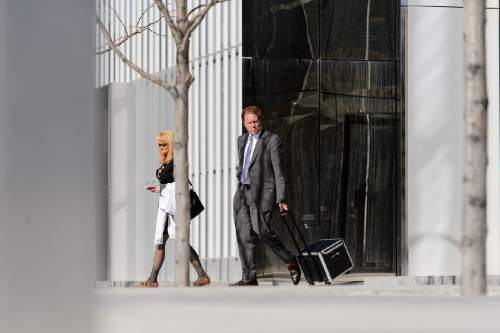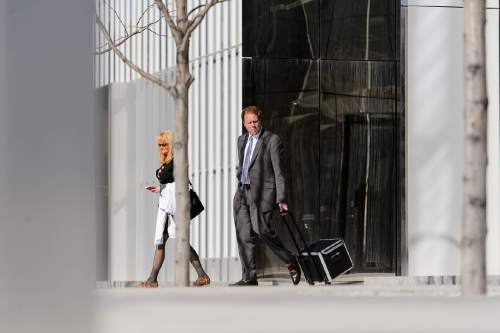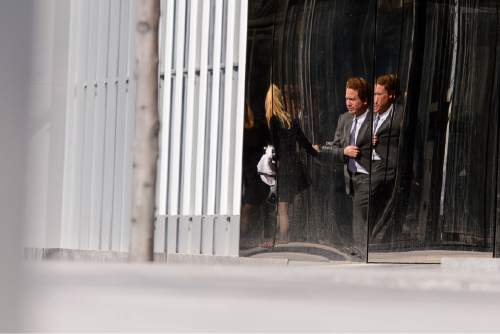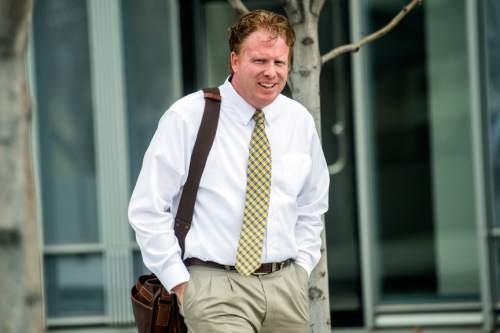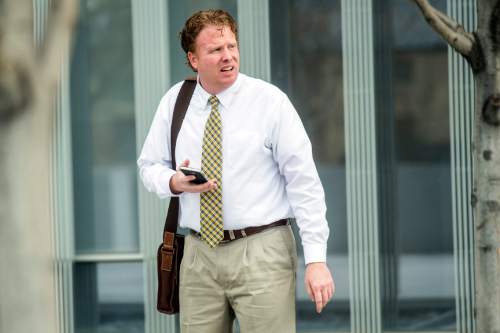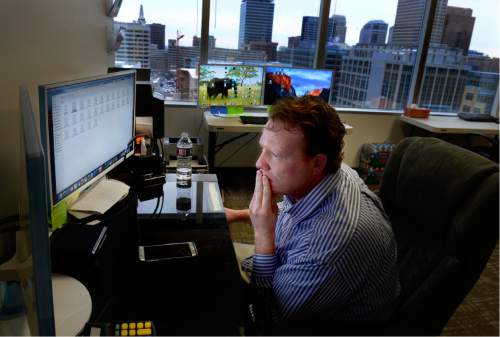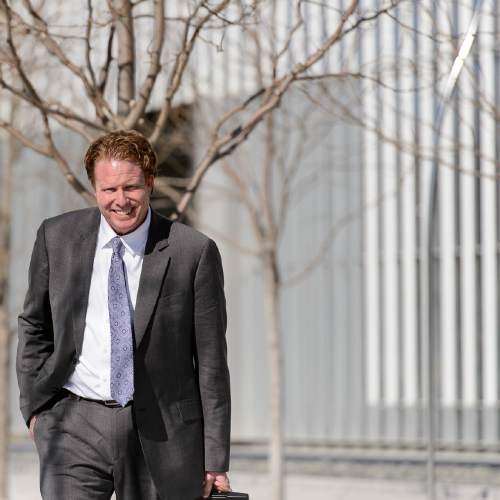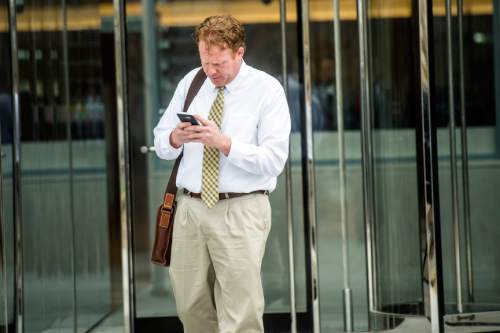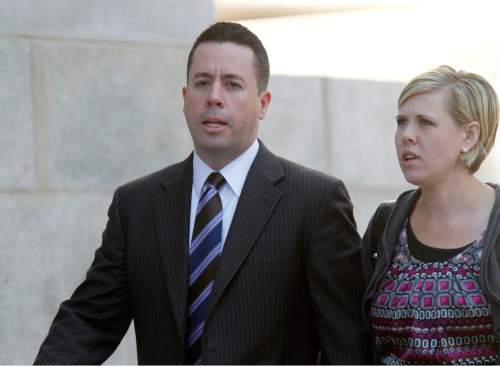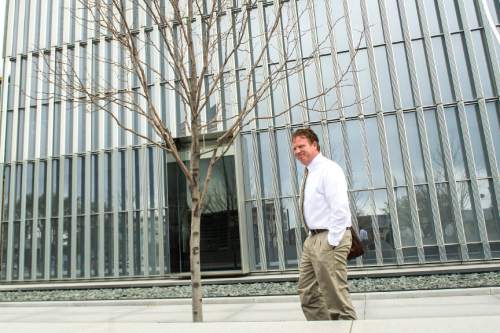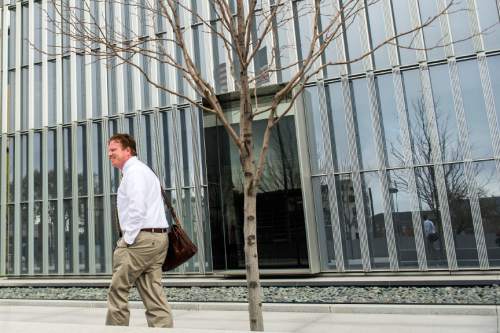This is an archived article that was published on sltrib.com in 2016, and information in the article may be outdated. It is provided only for personal research purposes and may not be reprinted.
U.S. District Judge David Nuffer stunned the defense and surprised prosecutors on Wednesday when he refused to allow testimony from the designated expert for the defense in the bank fraud trial of St. George businessman Jeremy Johnson and two others.
The ruling, a huge blow to the defendants as they were winding up their defense, left one of them in tears outside the courtroom, and family members who were in the gallery were also tearful and angry.
The three defendants and attorneys sat stunned at the defense table by the unexpected ruling, which meant they were unable to answer the opinions of the government's expert who had testified earlier in the trial that he found a "pattern of deception" in the operation of Johnson's online marketing company as it confronted major problems in 2009 to 2010.
"This is unfair," Marcus Mumford, the attorney for defendant Scott Leavitt, told Nuffer.
The decision also appeared to catch the prosecution by surprise.
Assistant U.S. Attorney Jason Burt had argued that the defense's proposed expert, California entrepreneur Gene Hoffman, shouldn't be allowed to testify on two of four areas as the defense proposed. Burt seemed to leave open the possibility that testimony might be appropriate in two other areas.
But Nuffer barred all testimony by Hoffman and then, when the judge asked government prosecutors whether they were ready to make their closing arguments on Wednesday instead of Thursday as planned, Burt said they needed more time.
The defense rested after calling one other witness, the prosecution's expert who had testified he found deception by employees in Johnson's company when they created dozens of new companies and then applied for accounts for use in charging consumers' credit cards.
Nuffer read jury instructions after the defense rested and said closing arguments would occur on Thursday and Friday, after which the jury will get the case, though it is possible the case could go the jury as early as Thursday.
Johnson is the only defendant who did not testify during the trial.
Johnson, Leavitt and co-defendant Ryan Riddle face 86 charges that revolve around allegations they defrauded Wells Fargo Bank. The government alleges that the fraud occurred when I Works went about creating dozens of companies by using names and personal information from employees and family members in order to obtain new bank accounts after its own accounts had been shut down due to excessive chargebacks.
Johnson and his co-defendants allegedly schemed to defraud Wells Fargo Bank by failing to disclose that all the new companies were linked to Johnson and using false information on account applications.
But the defense has tried to show that agents for Wells Fargo — companies called CardFlex and Mach 1, or later Blaze Processing — not only knew about, but directed Johnson and I Works on how to form the companies and obtain new accounts as a way to deal with an avalanche of chargebacks they said were caused by "rogue" independent merchants.
Hoffman is the co-founder, chairman and CEO of a company called Vindicia, which offers some credit card services to merchants. Under questioning from Mumford, Hoffman had spoken at length about his experience in setting up and helping merchants set up credit card accounts like those at issue in the Johnson case.
With the jury out of the room, Hoffman said he was familiar with the rules of credit card companies like Visa, had experience working with banks and companies to set up accounts and had helped companies deal with credit card chargebacks.
The defense said Hoffman would testify that:
• I Works was entitled to rely on CardFlex and Mach 1/Blaze for direction
• CardFlex knew the accounts were related to Johnson and that the accounts were high risk
• I Works met industry standards when opening the accounts
• There is no evidence the accounts were owned by Wells Fargo Bank
But Nuffer granted prosecutors' motion to exclude Hoffman's testimony, saying Hoffman's experience on matters at issue in the case was intermittent and that the defense had failed to disclose to the government in a timely manner two parts of his opinion about the evidence.
Mumford, arguing for Hoffman's testimony as an expert, said Hoffman would have used his experience on the merchant side of the credit card processing industry, as opposed to the banking side where the prosecution expert had worked.
"What the government is attempting to do in this case is to present the industry standards in a way that is contrary to real-world experience that those in the industry face," Mumford said.
Hoffman, Mumford said after Nuffer's ruling, would have testified that "the defendants in this case shouldn't be held to the standards that aren't really applied."


